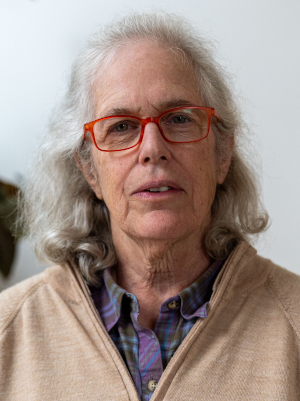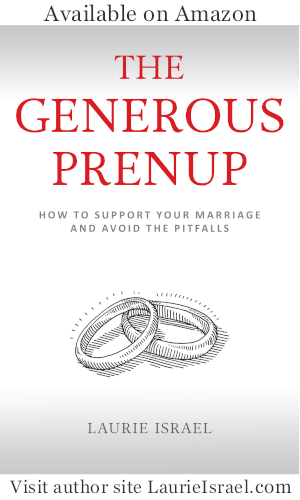By Laurie Israel
Congratulations! You have found love again after your peaceful (or not-so-peaceful) divorce from spouse #1. You have decided that you want to live together and blend your lives, just like in your first marriage when you were fairly young.
You (and your fiancé) believe marriage is an institution that will support your high level of commitment to each other. You want to do more than just date, or live together without being married. You see your relationship as permanent and wish it to be life-long and supportive throughout old age.
You believe you learned some lessons from your first marriage – both in terms in your choice of a spouse and how you can create a peaceful marriage. You are better prepared to support a marriage through its ups and downs and handle the inevitable conflict that goes along with marriage
However, there’s a little fly in the ointment. Both you and Mr. Right #2 have children from your previous marriages. They are in high school, college, or are in the process of launching their young adult careers. You both also have assets accumulated during your first marriages – you each have a home, retirement accounts, and other assets. You’re not particularly rich, but you do wonder, what happens if you divorce again. You also may be wondering how to leave a legacy to your children if your marriage stays together, but you die before Husband #2.
Central issues in Baby Boomer second marriages
Most people would like to leave a financial legacy to their children when they die. And many of our grown (and semi-grown) children need some financial help from us while we’re living, both in securing their education, and helping them embark on their adult lives. Our parents helped us, and we want to help our children. It’s a natural inclination, and an embodiment of parental love, which is fierce and protective.
But you also have another intention that you want to fulfill – providing security for your new Baby Boomer spouse. You love that person, too, and with love comes a sense of protectiveness.
You are remarrying in your 50s, 60s or even 70s. One of the aims of a “gray” marriage is to support each other as you grow older, enjoy retirement together, and care for each other as you age. This is part of a long-term marriage. Your allegiance and commitment to your new spouse must be very strong in order for the marriage to succeed. And that includes, in most cases, a financial commitment to your new spouse.
A challenge faced in Baby Boomer second marriages is how to balance the competing interests of our new spouse and our children. We want to support the well-being of our new spouse (who we love), and also to help our children by giving them a financial “leg up” during our lifetime and after our death.
What happens if I die without a prenup?
Most states have laws that protect the interest of a surviving spouse to inherit from his or her deceased spouse. If someone dies without a will (this is called “intestacy”), depending on the state and the family composition, a surviving spouse could obtain from 30% to 100% of the deceased spouse’s probate assets. Non-probate property (such as life insurance and retirement accounts) is distributed in accordance with the account owner’s beneficiary designations.
You can enter into a discussion with your fiancé before the marriage as to what your estate plans would be after each of your deaths. Will your assets be split between your surviving spouse and children? Will the surviving spouse hold some of your property for future distribution to your children?
In all states, a spouse has the right “to elect against the will.” That means, that if that spouse has been disinherited or receives an unreasonably small legacy, that spouse may apply for a statutory share of the deceased spouse’s estate. Depending on the state, this provides a widow or widower somewhere between the income generated from 30% of the estate and 50% of the entire estate outright.
An estate plan that provides a surviving spouse at least what this spousal election against the will or intestacy would provide (if that’s consistent with a spouse’s estate distribution intentions) would be a good way to divide an estate between a person’s (second) spouse and his or her children from a first marriage.
However, sometimes the surviving spouse will need to be supported during his or her lifetime before assets are distributed to the children of the first spouse to die. This can be done by estate planning that includes QTIP trusts, credit shelter trusts, and lifetime interests in real estate. All these possibilities need to be thought out carefully, with the guidance of an estate planning attorney.
The downside of relying on premarital (or post marital) discussions and decisions is that people can change their minds any time before their death. Also, sometimes flexibility is important in estate planning. Things can and should change as events unfold. But people can change their estate plans and beneficiary designations right up until the time they die. Sometimes this can result in a very undesirable surprise.
Then there’s the issue of divorce.
If the second Baby Boomer marriage ends in divorce, there is a full panoply of laws dealing with property division and spousal support. These laws have developed over many years. Their intent is to provide an equitable result based on the facts and circumstances of that particular marriage.
But some Baby Boomers have felt burned by their first divorces, especially if they had the bad luck of having a highly litigated divorce. (There are many better ways to get divorced!)
Where do Prenups fit in?
Prenups can provide certainty on these three issues: what happens if one of the spouses dies during the Baby Boomer marriage, what happens if there is a divorce, and if there is a divorce, how do you avoid litigation? Prenups can also provide ground rules as to how the couple will spend money and support each other financially during the marriage.
In a prenup, children of the first marriage can be protected, while balancing the financial needs of the new spouse. Divorce terms that seem fair and equitable can be included, and even some flexibility can be built in if things change in the future.
If there is a divorce, the method used in the divorce can be specified. It can be an alternative dispute resolution process such as mediation, collaborative law, or arbitration.
Prenups can also set the terms of how the new couple will financially assist their children from their previous marriages. Will there be lifetime gifts made equally to all of them? What if one child needs more help than the other children? What funds should this assistance come out of – previous premarital assets or assets and income earned and accumulated during the marriage?
Prenuptial agreements are not always the magic bullet they are touted to be. Because they are done right before the marriage, they often cause painful conflict between people who love each other at the very time feelings are the most tender. They pit people in opposition with each other, and often under the guidance of attorneys, the result ends up being extremely unsupportive of the financial needs of one of the new spouses, to the stark advantage of the other.
That’s because many attorneys view prenups solely as “asset protection” contract, without thinking about the health of the marriage or the well-being of a less-moneyed Baby Boomer spouse. Remember, showing caring and compassion to each other (even if you are negotiating a prenuptial agreement) bodes well for the health and survival of your new marriage. In fact, caring and compassion for the other is at the core of a successful marriage.
Prenups are generally enforceable, so the terms you have chosen will not be changeable unless you mutually agree on the changes. In this way, people entering into them can have peace of mind as to what will happen during their lives and after their death. But the downside is situations may change, and one of the spouses may be unwilling to change the terms of the prenup when the other spouse feels it’s appropriate to do so.
Remember to play fair.
If you’ve decided to negotiate a prenup, remember to play fair. Show your love of the person you are marrying by providing in the prenup for a soft landing in case your marriage ends in divorce. And as hard as it is (and despite a possible bad experience from your first divorce), remember that divorce laws can be good guidance when formulating terms in a prenup to address a split-up in a fair and compassionate way.
So, congratulations on your Baby Boomer second marriage. You have some choices to make –including whether or not to have a prenup. Also, you may want to have some serious discussions about the terms of your marriage and how you will handle your estates if one of you dies at a time when your marriage is intact. Be sure to get the guidance and information you need to understand the issues involved and how to address them. This will help make things clearer between you and will serve to make your marriage stronger when you tie the knot again.
Published in babyboomer.com online magazine on December 16, 2018.
© 2018. Laurie Israel. All rights reserved.
Laurie Israel is a lawyer located in Brookline, Massachusetts, practicing in the areas of tax law, estate planning, divorce law, and prenuptial agreements. As a prenuptial agreement lawyer, she works with high net worth clients planning for their marriages. Her writings on prenuptial agreements have appeared in the New York Times, the Wall Street Journal, and the Huffington Post. Laurie has been interviewed in a number of other publications and media, including New York magazine and BBC World News Service. She is the author of the recent book “The Generous Prenup: How to Support Your Marriage and Avoid the Pitfalls.”
- Mediation – A Sound First Step to a Successful Prenup - September 27, 2022
- The Art of the Term Sheet - May 18, 2022
- Learning from Every Mediation - August 4, 2021

